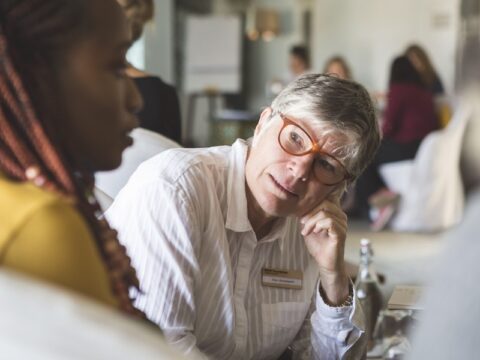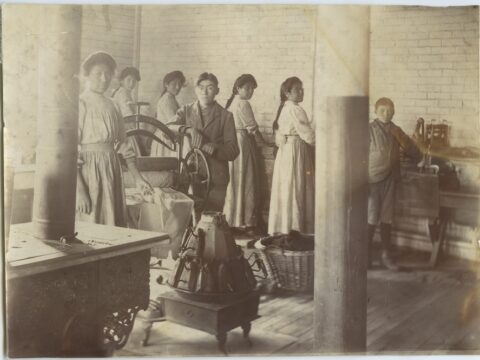Jesus said to her, “Do not hold on to me, because I have not yet ascended to the Father. But go to my brothers and say to them, ‘I am ascending to my Father and your Father, to my God and your God.’”
Mary Magdalene went and announced to the disciples, “I have seen the Lord,” and she told them that he had said these things to her. (John 20:17-18)
You may unsubscribe from any of our newsletters at any time.
It’s the time of year again when we are reminded of the mystery of our faith: Christ has died. Christ is risen. Christ will come again. And I wonder how well we believe this. In some ways, that it is a mystery lets us off the hook from having to imagine exactly what it means.
The American author Brené Brown talks about the need to “rumble” with concepts. I like that term. What would it mean for us, as the church, to really rumble with the mystery of our faith? Not just to placidly recite the prayer of Great Thanksgiving, but to rumble every day as if we truly believe Christ died, Christ is risen and Christ will come again?
The need to rumble with our faith is especially urgent as we face news stories about the state of the world and the church. It is, in part, why I started the Flourishing: Bold Ideas, Daring Connections project. I wanted the church and anyone in Canada to understand that we could think differently about the future and contribute to our collective flourishing. This work is more than the traditional visioning done in strategic planning. It’s about what kind of future you want for yourself, your community of faith and this country.
In doing this work, I’ve noticed a couple of things. The first is that some people light up with commitment and excitement about the possibilities of a renewing church. The second, much more concerning, is that the church sometimes feels dispirited — or at least, individuals within the church do. There is an unwillingness to believe that change could be desirable, good or possible. There is grief over the loss of bustling buildings full of people on evenings and weekends, multiple Sunday school classes and public recognition that The United Church of Canada was important, not just to our members but also to Canadian society.
One day in church last fall, we were talking about commitments folks would make. One person stood up and said, “We’ve been so interested in inviting young people to join us in worship. I am going to figure out how we invite them not to join us, but to make space for themselves, whatever that may look like.”
More on Broadview:
- As Easter approaches, I’m learning to embrace joy in ordinary life
- Easter calls us to change the world
- How apocalyptic scriptures can guide the church in hard times
This is the key to imagining a future we currently do not believe is possible. I’ve spoken these words before, but they bear repeating. We are so good in the United Church to proclaim: “All are welcome here. No matter who you are, no matter where you are on life’s journey, no matter who you love, you are welcome here.” That is beautiful. And for much of our recent history, it has been prophetic. But the implication is that you are welcome to come and be like us. The truth is that many communities of faith still have a long way to go in becoming genuinely inclusive. I’m thinking specifically of communities of faith who become officially affirming but everyone still does not understand why paying attention to pronouns is an important element of that welcome. Or churches that make hard choices with their scarce resources and avoid doing things such as making washrooms accessible.
In my previous role as executive director of First United Church Community Ministry Society in Vancouver’s Downtown Eastside, we undertook a community engagement process to redevelop our property. Our approach was to say, “This was designed with you in mind.” It meant we shifted from offering spaces and programs the way the church wanted to run them. Instead, we started listening to community partners and people who accessed our services.
We said, “Our vision is a neighbourhood where the worth of every person is celebrated and all thrive. If we could design a building that made that vision a reality, what would it need?” We got all kinds of brilliant feedback that we never would have thought of on our own. And we made space in the new building to incorporate that feedback. That building — and that ministry’s programs — were designed with the people we served in mind.
But to get there, to envision a ministry that is alive and thriving, we need to relinquish control and expectation, and leave space for dreaming and feedback. Sure, we have to worry about finances and burnout among our volunteers and ministers. Absolutely. Probably many communities of faith are avoiding hard conversations about their financial viability. But there is always opportunity in crisis. Theologian and professor Andrew Root says in his book The Church and the Crisis of Decline that it doesn’t matter if we have six or 600 members. What matters is the level of energy and engagement and, most importantly, a belief in a living and transcendent God who shows up and speaks to people.
In my travels, I have had tremendous opportunity to engage in conversations within the church about our new call and vision to be a church of deep spirituality, bold discipleship and daring justice. The more I come to understand these three aspects of our self-understanding as church, the more I value them. The church sure loves the piece about daring justice and how much we are or aren’t doing in the name of justice and if our justice-seeking is daring enough.
We all know prayer warriors and amazing leaders who run retreats, set spiritual direction and play a huge role in shaping the liturgical life of the church through worship and other spiritual practices. But we don’t know what it means to practise bold discipleship.
My sense is, as we moved closer to the cutting edge of where our Christian commitment to justice was leading us, it became a riskier type of solidarity. It was safer to turn our faith-gaze inward in terms of our Christian practice at the same time as telling the world where the arc of the moral universe should be bending toward justice. We also failed to really rumble with what it meant to be disciples of Christ in this radically inclusive and justice-seeking faith we value so dearly. As the world changed around us, we thought we couldn’t compete with school extracurriculars, so our kids stopped coming to Sunday school, Tyros, Explorers and CGIT. Fewer communities of faith had youth groups. Parents sent their kids to academic or sports programs in the summer rather than to church camp. Now, those of us under 60 are few and far between in the church.
If we want the church to continue this commitment to justice, we need to rumble with discipleship. We need to state its importance aloud, and we need to become biblically literate — this includes me. I was raised in the church to be deeply committed to justice. That was my primary understanding of church. I had personal faith experiences and encounters with God that I cannot explain logically that brought me back to the church. Even in theological school, I did the bare minimum in biblical studies. But I truly believe what Lutheran pastor and author Rev. Nadia Bolz-Weber says: scripture is too potent to be left to those who would weaponize it.
When finances and burnout become all we worry about, all our attention is drawn to, we forget that we come from a long line of faithful witnesses, servants, prophets and leaders who experienced this radically present and radically transcendent God. We come from a lineage of people who encountered burning bushes, rivers and seas that were parted with bare hands, and underdogs winning unexpectedly. They spoke with angels and wrestled with demons.
We say we believe in the mystery of our faith: Christ died, Christ is risen and Christ will come again. But do we really believe? Can we really believe? Believe in the way Mary Magdalene did when she encountered Christ three days after he died?
Can we be disciples who believe the unbelievable?
***
Rt. Rev. Carmen Lansdowne is the 44th moderator of The United Church of Canada.
This article first appeared in Broadview’s March 2024 issue with the title “Can You Believe it? Easter urges us to rumble with the mystery of our faith.”













